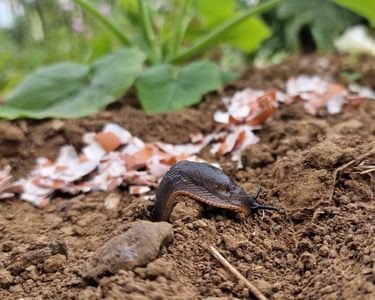Was 2024 the worst gardening year on record?

The challenging climatic conditions of 2024 were reflected in our veg growing survey. The mild winter, followed by a cool and very damp spring meant slugs flourished in abundance. And low levels of sunshine effected the performance of many vegetables.
A large number of you were disappointed with the 2023 growing season, but it appears that the 2024 season managed to trump it in terms of poor performance! One grower stated: “This was the most disappointing growing year in my 50 years of gardening.”
Other common words among your survey answers summed up the season, including: “slugs and snails” and “later than usual”. Many people awarded the season with the title “year of the slug”.
Impact of the wet weather
Our survey showed that conditions meant direct sown crops were demolished as soon as they emerged, with many people repeat sowing numerous times just to try and establish a crop. You commented that slugs attacked plants that were normally untouched, even felling tomato plants in one location.
Additionally, the very cool spring meant that there were few pollinators around, so fruits failed to set on beans, cucurbits and tomato plants. The low levels of sunshine resulted in generally lower yields.
There were also quite a few reports of leafy crops such as chard and lettuce starting to flower early. This phenomenon is not something we have commonly observed, it’s usually associated with hot dry conditions.
What grew well in 2024
There were some redeeming features of 2024. The lack of insects meant that there were fewer insects pests – cabbage white butterflies did not arrive until late august, but then, due to the mild autumn, they persisted into November. The mild autumn also allowed people to harvest a lot later than usual, although low light levels compromised yields and quality.
For more detailed analysis and the full survey results click here.